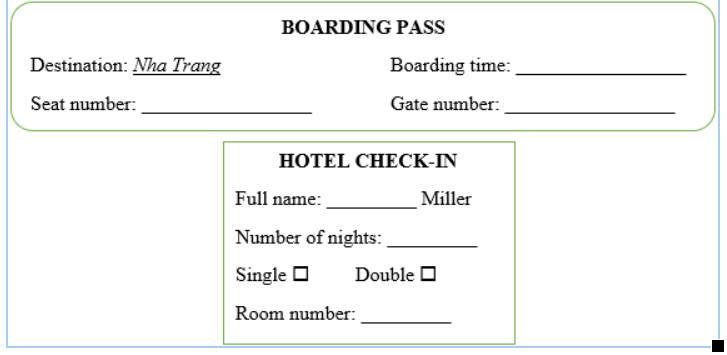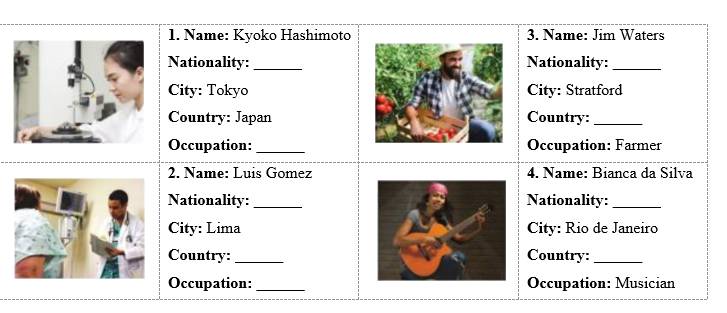Listen again and write the missing information.
(Nghe lại và ghi thông tin còn thiếu.)

Listen to Lucy and Mark talking about their plans for summer job. Fill in the missing information in the spaces. You will hear the recording twice.
(Hãy nghe Lucy và Mark nói về kế hoạch của họ cho công việc mùa hè. Hãy điền thông tin còn thiếu vào chỗ trống. Bạn sẽ được nghe hai lần.)
Lucy:So, what are you going to do this summer?
Mark:Well, I'm probably going to go on vacation with my family for a week, but I think that I should get a summer job because I need to get some money. Actually, I haven't decided yet. What about you?
Lucy:I'm going to Thailand for the summer. I'm going to work as a (1) in a Thai restaurant for 2 months.
Mark:Really? That sounds great! Is it a (2) job?
Lucy:Yes. Actually, the work won't be very interesting. It'll be mostly taking orders, serving food and drinks and dealing with bill (3) . My manager is so generous to (4) me $800/ month.
Mark:Great! I wish I could get a job with such a high (5) like that. It'll be like a holiday, but you'll be earning money too.
Lucy:Yes, it's a chance to go abroad and maybe meet some new people. I think that I won't be under job (6) because my hours are 5 hours per day, so I'll have plenty of time during the day to go walking.
Mark:How did you find out about it?
Lucy:I read about it in a book called Summer Work Abroad. It tells you about all kinds of different jobs in different places. You can work as a (7) in Bangkok. They need people who can speak English well.
Mark:Oh! I like the sound of that!
Lucy:Yes, of course the problem with that sort of work is that it is a (8) job so you're paid hourly. And If you like it, you should (9) now.
Mark:Oh! I haven't decided yet.
Lucy:You know within just 2 days, we have received more than 200 (10) .
Mark:OK. Anyway, it's worth a try. Thank you, Lucy.
Exercise 4. Read the Skills Strategy and listen again. What two extra pieces of information do you hear? Choose from a-d.
(Đọc Chiến thuật và nghe lại. Hai thông tin bổ sung mà em nghe được là gì? Chọn a-d.)
SKILLS STRATEGY |
How to do the listening quiz: • First, read all the questions and options. • Next, predict the general meaning of the text. • Then, focus on the detail you need and then choose the correct option. |
a. Scorpions are intelligent.
b. Some of the smallest scorpions are the most dangerous.
c. Ostriches are the heaviest, fastest, and tallest birds.
d. Some monkeys can speak.
Two extra pieces of information I hear are b and c.
(Hai thông tin bổ sung là b và c.)
A. Look at the photos. Guess the missing information with a partner.
(Nhìn vào các bức tranh. Đoán thông tin còn thiếu với bạn cùng luyện tập.)

E. Write the missing words in this conversation. Listen and check your answers. What words describe Pat's new diet?
(Viết những từ còn thiếu vào trong cuộc hội thoại. Nghe và kiểm tra câu trả lời của bạn. Những từ nào mô tả chế độ ăn mới của Pat?)
Kim: Hi Pat. You look great!
Pat: Thanks! It's my new diet.
Kim: Really? What do you eat?
Pat: (1) _____ of meat and fish, but I don't eat (2) _____ bread. Oh, and I eat a (3) _____ vegetables, of course.
Kim: (4) _____ much fruit can you eat?
Pat: Just a (5) _____ after every meal.
Kim: What about snacks?
Pat: Well, I can eat a (6) _____ nuts, and sometimes I eat a (7) _____ chocolate, but it’s organic, so there isn’t (8) _____ added sugar in it.
Kim: Mmm, sounds good! Maybe I’ll try your diet.
1. Lots
2. much
3. few
4. How
5. little
6. few
7. little
8. much
C. Listen again. In pairs, fill in the information below. Each of you fills in one section. Then tell your partner your answers.
(Nghe lại một lần nữa. Thực hành theo cặp, điền thông tin bên dưới. Mỗi bạn điền vào một phần. Sau đó, nói cho bạn bên cạnh câu trả lời của mình.)
Student A: What do these people usually do? When?
1. Alan and Karen usually ___________ on ___________.
2. Khaled usually ___________ in ___________.
3. Liam usually ___________ on ___________.
Student B: What are these people doing now?
1. Alan and Karen ______________________.
2. Khaled ______________________.
3. Liam ______________________.
C. Listen again and write notes in the table about each topic.
(Nghe lại lần nữa và viết ghi chú vào bảng về mỗi chủ đề.)
Ms. Harmon (Cô Harmon) | Mr. Liu (Anh Liu) | |
Subjects in college (Các môn học ở đại học) | ||
Travel and places visited (Du lịch và những địa điểm đã ghé thăm) | ||
Experience as a tour guide (Kinh nghiệm làm hướng dẫn viên du lịch) | ||
Driver's license (Bằng lái xe) | ||
Experience with groups (Trải nghiệm với nhóm) |
13. Listen to an announcement at the Nội Bài Airport and fill in the blanks with pieces of specific information.
(Nghe thông báo tại Sân bay Nội Bài và điền thông tin cụ thể vào chỗ trống.)
This is the pre-boarding announcement for flight (1) …………… to Hô Chí Minh City. We are now inviting those passengers with (2) …………… ,and any passengers requiring special (3) …………… , to begin boarding at this time.Please have your boarding (4) …………… and identification ready. Regular boarding will beginin approximately (5) …………… minutes' time.
Thank you.
1. VN221
2. children
3. assistants
4. pass
5. 10
Select the antonym of the following bold and underlined word in each sentence in the unit
Listen to the old man’s story again and write in the missing words.
A. existing
B. near
C. here
D. nearby
C. Read the information. Then listen to the strong and weak forms of the questions.
(Đọc thông tin. Sau đó, nghe các dạng phát âm mạnh và yếu của các câu hỏi.)
PRONUNCIATION: Weak Forms of Do you have … and Would you like … (Phát âm: Dạng phát âm yếu của “Do you have …” và “Would you like …”) | |
In natural speech, Do you have … and Would you like … are often reduced at the beginning of questions. This means that some sounds change, or are not said at all. (Trong lời nói tự nhiên, “Do you have …” và “Would you like …” thường được giảm nhẹ ở đầu câu hỏi. Điều này có nghĩa là một số âm thanh thay đổi, hoặc hoàn toàn không được phát âm.) | |
1. Do you have any oranges? Strong: /du ju hæv/ Weak: /dəjə haev/ | 2. Would you like some milk? Strong: /wʊd ju laɪk/ Weak: /wʊdʒə laɪk / |